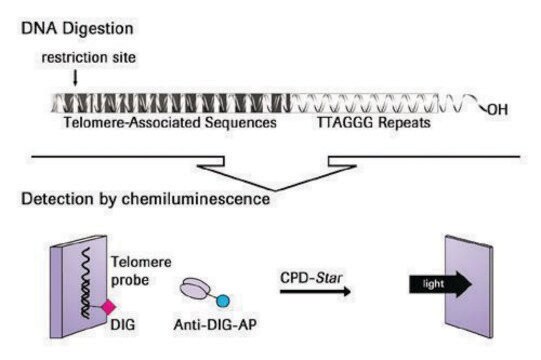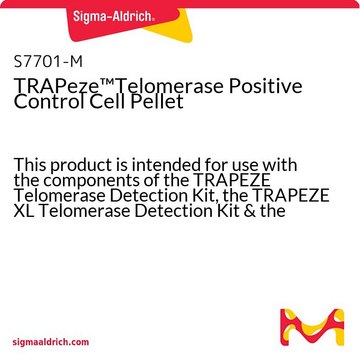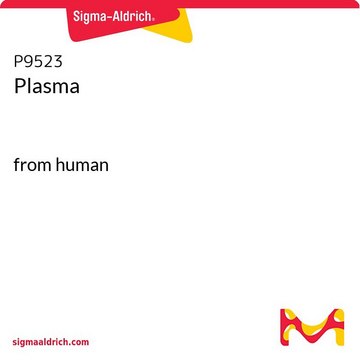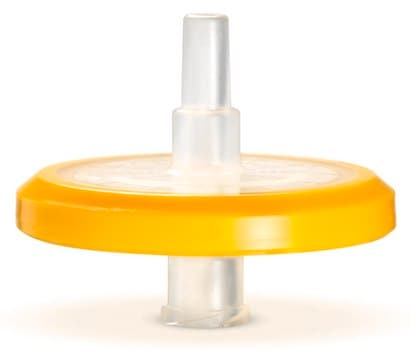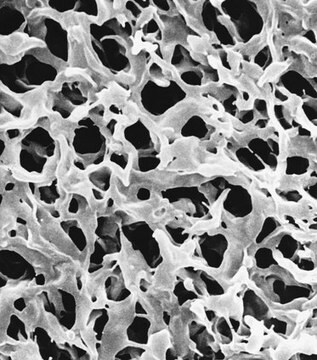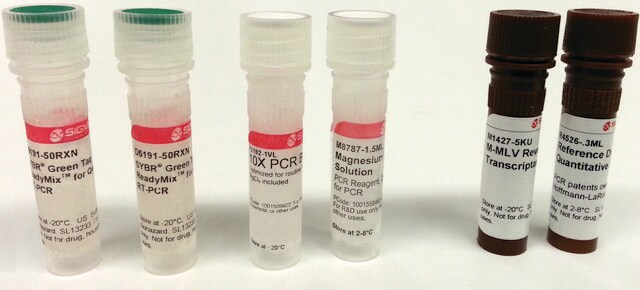S7710
Kit TRAPeze™ RT per la rivelazione dell′attività telomerasica
A highly sensitive in vitro assay for the fluorometric detection & real time quantification of telomerase activity in cells.
Sinonimo/i:
TRAP Assay
Autenticatiper visualizzare i prezzi riservati alla tua organizzazione & contrattuali
About This Item
Codice UNSPSC:
12161503
eCl@ss:
32161000
NACRES:
NA.32
Prodotti consigliati
Livello qualitativo
Produttore/marchio commerciale
Chemicon®
TRAPeze™
applicazioni
genomic analysis
Condizioni di spedizione
dry ice
Descrizione generale
TRAPeze™ RT è un test in vitro altamente sensibile per la rilevazione fluorimetrica e la quantificazione in tempo reale dell'attività della telomerasi. Presenta dei perfezionamenti rispetto al test TRAPeze™ originale a cui aggiunge la capacità di quantificare l'attività della telomerasi utilizzando dei primer per il trasferimento di energia di fluorescenza (ET)
Telomeres are specific structures found at the end of chromosomes in eukaryotes. In human chromosomes, the telomeres consist of thousands of copies of 6 base repeats (TTAGGG)(1-3). It has been suggested that telomeres protect chromosome ends since damaged chromosomes lacking telomeres undergo fusion, rearrangement and translocation (2). In somatic cells, telomere length is progressively shortened with each cell division both in vivo and in vitro (4-7) due to the inability of the DNA polymerase complex to synthesize the very 5′ end of the lagging strand (8,9).
Telomerase is a ribonucleoprotein that synthesizes and directs the telomeric repeats onto the 3′ end of existing telomeres using its RNA component as a template (10-14). Telomerase activity has been shown to be specifically expressed in immortal cells, cancer and germ cells (15,16) where it compensates for telomere shortening during DNA replication and thus stabilizes telomere length (7,17). These observations have led to a hypothesis that telomere length may function as a "mitotic clock" to sense the number of cell divisions and eventually signal replicative senescence or programmed cell death when a critical telomere length is achieved. Therefore, expression of telomerase activity in cancer cells may be a necessary and essential step for tumor development and progression (16,18-20). The causal relationship between expression of telomerase and telomere length stabilization and the extension of the life span of the human cell has recently been reported (21).
The development of a sensitive and efficient PCR-based telomerase activity detection method, TRAP (Telomeric Repeat Amplification Protocol) (15, 22), has made possible large scale surveys of telomerase activity in human cells and tissues (15, 23-29). To date, telomerase activity has been detected in over 85% of all tumors tested spanning more than 20 different types of cancers (30-31).
The TRAPeze™ RT Telomerase Detection Kit is a highly sensitive in vitro assay for the fluorometric detection and real time quantification of telomerase activity. It incorporates refinements to the original TRAP assay that were first introduced in the gel-based TRAPeze™ Telomerase Detection Kit (Cat. No. S7700) and adds the ability to quantitate telomerase activity using fluorescence energy transfer (ET) primers similar to the TRAPeze™ XL Telomerase Detection Kit (Cat. No. S7707). As in the original TRAPeze™ Kit, primer sequence modifications that reduce amplification artifacts and PCR controls for standard curve generation are included. In addition, both the TRAPeze™ RT and XL Kits use fluorescence energy transfer (ET) primers to generate fluorescently labeled TRAP products which permit nonisotopic, quantitative analysis of telomerase activity.
The unique design of these ET primers (Amplifluor® primers) allows detection and quantification of telomerase activity by directly measuring real time fluorescence emission in the reaction vessels. Since Amplifluor® primers will fluoresce only upon incorporation into the TRAP products, post-PCR sample manipulations such as electrophoretic gel or ELISA analyses are eliminated, thereby reducing the the risk of carry-over contamination. Quantitative analysis is not compromised when detection is performed in a high-throughput 96-well format unlike platforms utilizing a qualitative ELISA. Additionaly, an additional stand alone control is provided separately to assess PCR inhibitors that may be present in experimental samples. (Please see product insert for references).
Telomerase is a ribonucleoprotein that synthesizes and directs the telomeric repeats onto the 3′ end of existing telomeres using its RNA component as a template (10-14). Telomerase activity has been shown to be specifically expressed in immortal cells, cancer and germ cells (15,16) where it compensates for telomere shortening during DNA replication and thus stabilizes telomere length (7,17). These observations have led to a hypothesis that telomere length may function as a "mitotic clock" to sense the number of cell divisions and eventually signal replicative senescence or programmed cell death when a critical telomere length is achieved. Therefore, expression of telomerase activity in cancer cells may be a necessary and essential step for tumor development and progression (16,18-20). The causal relationship between expression of telomerase and telomere length stabilization and the extension of the life span of the human cell has recently been reported (21).
The development of a sensitive and efficient PCR-based telomerase activity detection method, TRAP (Telomeric Repeat Amplification Protocol) (15, 22), has made possible large scale surveys of telomerase activity in human cells and tissues (15, 23-29). To date, telomerase activity has been detected in over 85% of all tumors tested spanning more than 20 different types of cancers (30-31).
The TRAPeze™ RT Telomerase Detection Kit is a highly sensitive in vitro assay for the fluorometric detection and real time quantification of telomerase activity. It incorporates refinements to the original TRAP assay that were first introduced in the gel-based TRAPeze™ Telomerase Detection Kit (Cat. No. S7700) and adds the ability to quantitate telomerase activity using fluorescence energy transfer (ET) primers similar to the TRAPeze™ XL Telomerase Detection Kit (Cat. No. S7707). As in the original TRAPeze™ Kit, primer sequence modifications that reduce amplification artifacts and PCR controls for standard curve generation are included. In addition, both the TRAPeze™ RT and XL Kits use fluorescence energy transfer (ET) primers to generate fluorescently labeled TRAP products which permit nonisotopic, quantitative analysis of telomerase activity.
The unique design of these ET primers (Amplifluor® primers) allows detection and quantification of telomerase activity by directly measuring real time fluorescence emission in the reaction vessels. Since Amplifluor® primers will fluoresce only upon incorporation into the TRAP products, post-PCR sample manipulations such as electrophoretic gel or ELISA analyses are eliminated, thereby reducing the the risk of carry-over contamination. Quantitative analysis is not compromised when detection is performed in a high-throughput 96-well format unlike platforms utilizing a qualitative ELISA. Additionaly, an additional stand alone control is provided separately to assess PCR inhibitors that may be present in experimental samples. (Please see product insert for references).
Confezionamento
Il kit fornisce reagenti sufficienti per eseguire 224 reazioni TRAPeze™ RT).
Componenti
CHAPS Tampone di lisi - (13,5mL)
Miscela di reazioneTRAPeze™ RT - 5X (1,12mL)
Miscela di controlloTRAPeze™ – 5X (1,12mL)
Acqua di grado PCR - (8,2mL)
TSR8* (templato di controllo per la quantificazione) (45 μL)
TSK* (controllo per inibizione/normalizzazione) (45 μL).
Pellet di cellule di controllo - (cellule positive per la telomerasi, 106 cellule)
* Avvertenze - fare riferimento alla sezione II. Componenti del kit, norme di sicurezza nel foglietto illustrativo del prodotto
Miscela di reazioneTRAPeze™ RT - 5X (1,12mL)
Miscela di controlloTRAPeze™ – 5X (1,12mL)
Acqua di grado PCR - (8,2mL)
TSR8* (templato di controllo per la quantificazione) (45 μL)
TSK* (controllo per inibizione/normalizzazione) (45 μL).
Pellet di cellule di controllo - (cellule positive per la telomerasi, 106 cellule)
* Avvertenze - fare riferimento alla sezione II. Componenti del kit, norme di sicurezza nel foglietto illustrativo del prodotto
Stoccaggio e stabilità
1. Tampone di lisi CHAPS da - 15°C a -25°C
2. Miscela di reazioneTRAPeze™ RT, 5x, da -15°C a -25°C
3. Miscela di controllo TRAPeze™ - 5X, da 2°C a 8°C
4. Acqua di grado PCR da - 15°C a -25°C
5. TSR8 da -15°C a -25°C
6. TSK da -15°C a -25°C
7. Pellet di cellule di controllo da -75°C a -85°C
2. Miscela di reazioneTRAPeze™ RT, 5x, da -15°C a -25°C
3. Miscela di controllo TRAPeze™ - 5X, da 2°C a 8°C
4. Acqua di grado PCR da - 15°C a -25°C
5. TSR8 da -15°C a -25°C
6. TSK da -15°C a -25°C
7. Pellet di cellule di controllo da -75°C a -85°C
Note legali
ABI PRISM is a registered trademark of Applera Corporation or its subsidiaries in the US and/or certain other countries
Amplifluor is a registered trademark of Merck KGaA, Darmstadt, Germany
CHEMICON is a registered trademark of Merck KGaA, Darmstadt, Germany
Opticon is a trademark of Bio-Rad Laboratories, Inc.
TRAPEZE is a trademark of Merck KGaA, Darmstadt, Germany
iCycler is a registered trademark of Bio-Rad
Avvertenze
Warning
Indicazioni di pericolo
Consigli di prudenza
Classi di pericolo
Aquatic Chronic 3 - Met. Corr. 1
Codice della classe di stoccaggio
8B - Non-combustible corrosive hazardous materials
Punto d’infiammabilità (°F)
Not applicable
Punto d’infiammabilità (°C)
Not applicable
Certificati d'analisi (COA)
Cerca il Certificati d'analisi (COA) digitando il numero di lotto/batch corrispondente. I numeri di lotto o di batch sono stampati sull'etichetta dei prodotti dopo la parola ‘Lotto’ o ‘Batch’.
Possiedi già questo prodotto?
I documenti relativi ai prodotti acquistati recentemente sono disponibili nell’Archivio dei documenti.
I clienti hanno visto anche
Cullin 5 regulates cortical layering by modulating the speed and duration of Dab1-dependent neuronal migration.
Sim?? S, Jossin Y, Cooper JA
The Journal of Neuroscience null
Sandra Donnini et al.
FASEB journal : official publication of the Federation of American Societies for Experimental Biology, 24(7), 2385-2395 (2010-03-09)
Cerebral amyloid angiopathy (CAA) caused by amyloid beta (Abeta) deposition around brain microvessels results in vascular degenerative changes. Antiangiogenic Abeta properties are known to contribute to the compromised cerebrovascular architecture. Here we hypothesize that Abeta peptides impair angiogenesis by causing
A Static Magnetic Field Inhibits the Migration and Telomerase Function of Mouse Breast Cancer Cells.
Zhu Fan et al.
BioMed research international, 2020, 7472618-7472618 (2020-05-29)
Static magnetic field (SMF) has a potential as a cancer therapeutic modality due to its specific inhibitory effects on the proliferation of multiple cancer cells. However, the underlying mechanism remains unclear, and just a few studies have examined the effects
Kim E Innes et al.
Journal of Alzheimer's disease : JAD, 66(3), 947-970 (2018-10-16)
Telomere length (TL), telomerase activity (TA), and plasma amyloid-β (Aβ) levels have emerged as possible predictors of cognitive decline and dementia. To assess the: 1) effects of two 12-week relaxation programs on TL, TA, and Aβ levels in adults with
Sadia Mohsin et al.
Circulation research, 113(10), 1169-1179 (2013-09-21)
Myocardial function is enhanced by adoptive transfer of human cardiac progenitor cells (hCPCs) into a pathologically challenged heart. However, advanced age, comorbidities, and myocardial injury in patients with heart failure constrain the proliferation, survival, and regenerative capacity of hCPCs. Rejuvenation
Il team dei nostri ricercatori vanta grande esperienza in tutte le aree della ricerca quali Life Science, scienza dei materiali, sintesi chimica, cromatografia, discipline analitiche, ecc..
Contatta l'Assistenza Tecnica.